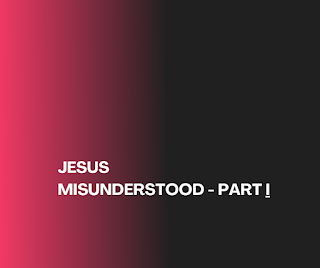JESUS, MISUNDERSTOOD. - PART I
The gospels show that even Jesus’disciples did not understand him at
first. He was “flesh and blood” (Hebrews 2:14) like all of fus, He had a family,
a profession, but the disciples noticed that He was differente. His attitudes,
his speech, his spirituality and his power to perform miracles made the disciples
see him as the Messiah who was to come, but not exactly as they thought.
One night, while they
were crossing the Sea of Galilee, Jesus was sleeping in the stern of the boat,
when a great storm came so that the disciples despaired and woke him up, crying
for help. Then Jesus rebuked the wind and the fury of the sea, and soon there
came a great calm. When the disciples saw Him doing this, they were astonished
and said to one another, "Who is this? Even the wind and the waves obey
him!" (Mark 4:35-41).
But this misunderstanding
of the person of Jesus was not limited to the disciples alone. On one occasion
He returned to the city where He grew up, Nazareth, and as He preached in the
synagogue, many of His countrymen said, "Where did this man get these
things?”... “What’s this wisdom that has been given him? What are these
remarkable miracles he is performing? Isn’t this the carpenter? Isn’t this
Mary’s son and the brother of James, Joseph, Judas and Simon? Aren’t his
sisters here with us?" (Mark 6.1-3).
On another occasion,
after having performed the miracle of multiplying five loaves and two small
fishes in a quantity sufficient to feed the crowd that followed him, the people
said: "Surely this is the Prophet who is to come into the world" and
wanted to proclaim him king (John 6:14-15). Then, after Jesus gave a speech to
that same crowd, the people said to each other, "Is this not Jesus, the
son of Joseph, whose father and mother we know?" (John 6:42).
Thus, it is observed that
they did, in fact, see Jesus as the King who was to come (John 1:35-42). The
point, however, is that, according to the Gospel narratives, the diciples, like
all Jews of that time, awaited the arrival of a political-nationalist Messiah who
would deliver them from Rome and elevate Israel to a status of prominence among
the nations. But the problem is that Jesus was not involved in politics.
This whole issue,
surrounding the person of Jesus, stemmed from the fact that, since the time of
King David, there was the prophecy of the prophet Nathan, in which God spoke to
that king: "Your house and your kingdom will endure forever before me ; your
throne will be established forever" (2 Samuel 7:16). Therefore, in those
days, when Jesus came into the world, there was a very strong messianic
expectation because of the growing dissatisfaction with Roman domination over
Israel.
Jesus was of the seed of
David (Luke 2:4; Romans 1:3; 2 Timothy 2:8), but He was not concerned about
Israel's earthly situation. This nation was created by God (Genesis 12:1,2) to
enter, in the world, the Messiah who would solve the problem of humanity that
was established after original sin: the condemnation of eternal death, an
eternal life separated from the Creator.
However, since the period
of the reign, a process of secularization began in Israel and, therefore, they
developed this notion of a political-nationalist messiah. But Jesus' messianacy
was spiritual. Jesus was God, in the person of the Son, who entered the world
to rescue man from the condemnation of death, creating a new humanity and
establishing his eternal Kingdom. In the divine plan, this is what the Messiah
would come into the world for. It was in this sense that David's kingdom would
be eternal (Psalm 89:30-38; Isaiah 9:6,7).
After two thousand years of Christian culture, Jesus
Christ remains misunderstood to humanity. Its complex nature, absolutely human
and admirably divine, can only be understood spiritually. It is as Christ
Himself said: "No one knows who the Son is except the Father; no one knows
who the Father is, except the Son and those to whom the Son chooses to reveal
him" (Luke 10:22). But in His goodness, He says, "Come to me, all you who are weary and
burdened, and I will give you rest" (Matthew 11:28).
Antônio
Maia – Ph.B., M. Div.
Copyrights
reserved



Comments
Post a Comment